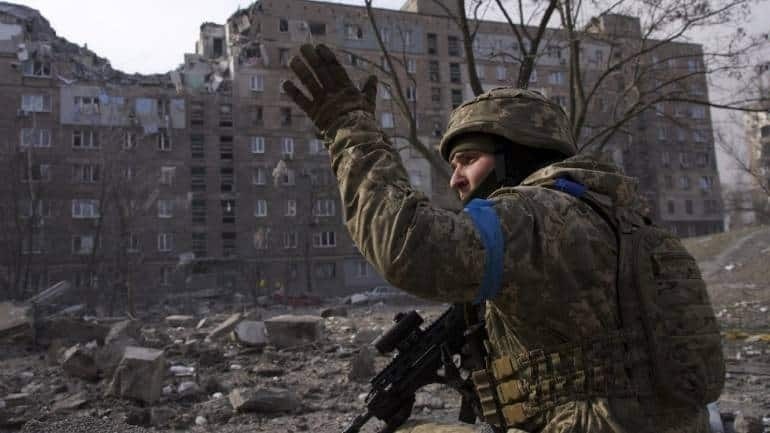LVIV/KHARKIV, Ukraine, (Reuters) – Ukraine and Russia were preparing today for the first face-to-face peace talks in more than two weeks, but a senior U.S. official said Russian President Vladimir Putin did not appear ready to make compromises to end the war.
Ukrainian officials also played down the chances of a major breakthrough at the talks, due to be held in Istanbul after Turkish President Tayyip Erdogan spoke to Russia’s Vladimir Putin on Sunday.
But the fact that they were taking place in person at all – for the first time since an acrimonious meeting between foreign ministers on March 10 – was a sign of shifts behind the scenes as Russia’s invasion has become bogged down.
On the ground, there was no sign of respite for civilians in besieged cities, especially the devastated port of Mariupol, whose mayor said 160,000 people were still trapped inside and Russia was blocking attempts to evacuate them.
But the mayor of Irpin, near Kyiv, said Ukrainian forces had seized back full control of the town. “We have good news today – Irpin has been liberated,” Oleksandr Markushyn said, adding that it expected further attacks and would defend itself. Reuters could not immediately verify the information.
In Kharkiv, Ukraine’s second-biggest city and one of its hardest hit, people were sweeping rubble out of a classroom on the third storey of a school, where a wall had been blown out by a missile before dawn.
“This is a civilian target. It’s a school!” said Oleksandr, who had been sheltering with his mother on a lower floor of the school after their own neighbourhood was hit. “They’ve not been able to take the city, so they’ve decided to destroy it.”
Russia and Ukraine said their delegations would arrive in Turkey today, with the talks due to start tomorrow.
Ukrainian officials have recently suggested Russia could be more willing to compromise having seen stiff Ukrainian resistance and heavy Russian losses.
But a senior U.S. State Department official said Putin did not give that impression. “Everything I have seen is he is not willing to compromise at this point,” the official told Reuters on condition of anonymity after Ukraine’s president sketched out a potential way to end the crisis over the weekend.
Russia’s military signalled last week it would concentrate on expanding territory held by separatists in eastern Ukraine, a month after having committed the bulk of its huge invasion force to a failed assault on Kyiv.
But Ukraine said it saw no sign Russia had given up a plan to surround the capital, where the mayor, Vitali Klitschko, said 100 people had been killed, including 4 children, and 82 multi-storey buildings had been destroyed. It was not possible to verify the figures.
When the sides last met in person, Ukraine accused Russian Foreign Minister Sergei Lavrov of ignoring pleas to discuss a ceasefire, while Lavrov said a halt to fighting was not even on the agenda.
Since then, they have held talks via video link and publicly discussed a formula under which Ukraine might accept some kind of formal neutral status. But neither side has budged over Russia’s territorial demands, including Crimea, which Moscow seized and annexed in 2014, and eastern territories known as the Donbas, which Moscow demands Kyiv cede to separatists.
“I don’t think there will be any breakthrough on the main issues,” Ukrainian interior ministry adviser Vadym Denysenko said.
In an interview with Russian journalists at the weekend, Ukrainian President Volodymyr Zelenskiy mentioned some form of “compromise” involving Donbas, although he did not suggest this might involve ceding the territory. In his latest comments he said territorial integrity remained Kyiv’s priority.
Russia calls its actions in Ukraine a “special military operation” to disarm and “denazify” its neighbour. Kyiv and the West consider this a pretext for an unprovoked invasion to try to topple the elected Ukrainian government.
Last week, Ukrainian forces went on the offensive, pushing Russian troops back in areas around Kyiv, the northeast and the southwest. Russia kept up pressure in the southeast near separatist areas, including its devastating siege of Mariupol.
Mayor Vadym Boichenko, speaking from an undisclosed location outside the city, said 26 buses were waiting to evacuate some of 160,000 trapped civilians but Russia was denying safe passage.
“People are beyond the line of humanitarian catastrophe,” Boichenko said on national television. “We need to completely evacuate Mariupol.” A spokesperson for Boichenko said later that nearly 5,000 people had been killed and 90% of buildings damaged, of which 40% were destroyed.
Deputy Prime Minister Iryna Vereshchuk said there were no plans to open corridors to evacuate civilians from besieged cities on Monday, because of intelligence reports of possible Russian “provocations” along the routes.
Elsewhere, Russia’s armoured columns are bogged down, with trouble resupplying and making little or no progress.
Britain’s defence ministry said there had been no major change in Russia’s positions in the past 24 hours, with most Russian gains near Mariupol and heavy fighting underway there.
“As of today, the enemy is regrouping its forces, but they cannot advance anywhere in Ukraine,” Ukrainian Deputy Defence Minister Hanna Malyar said on Monday.






